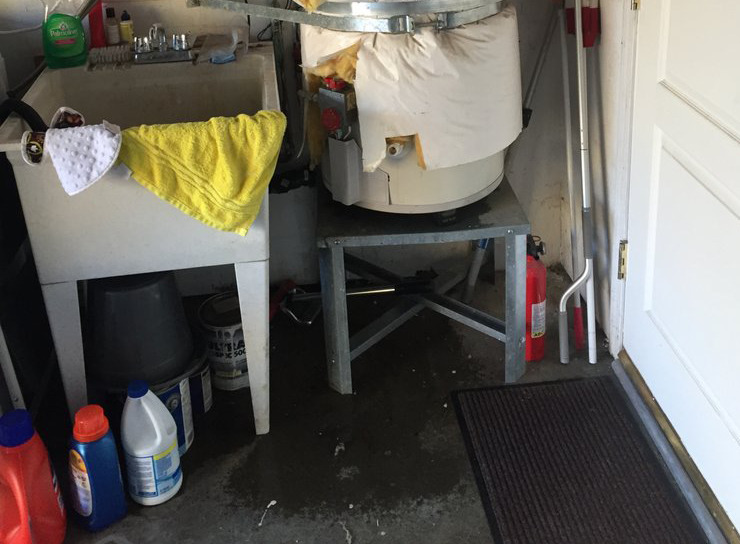
You count on your water heater for giving you hot showers, hot water for doing dishes, for washing your clothes and more. So, when you see a leak around your water heater, you want to know where the leak is and why it’s happening. The good news is that it doesn’t always mean that you need a new water heater. Below are four common reasons why your water heater is leaking.
The Lines to the Water Supply is Leaking
First, you want to check your plumbing pipes above your water heater. If there are drips coming down from above, it can leak down easily on top of your water heater. It might even go down its insulation, so it looks like your tank is leaking.
Check your pipes above your water heater, standing on a stepladder if you have to. Give the lines that are going into your water heater special attention. These could be flexible tubes or rigid connections. The flexible tubes are the ones cause the majority of leaks above your water heater, since they can fail way before you need to replace your water heater. If there’s insulation around these tubes, remove it. This will let you inspect them closely and replace them if needed.
If these need replacing, take the following steps:
- Shut off the water to your water heater using your shutoff valve.
- Verify the water’s turned off by turning on a hot faucet in your house and see if the water’s flowing. If it’s shut off successfully, there shouldn’t be any water flowing from your water heater.
- To replace the water heater flex lines, first shut the water off to the water heater. This will be a shutoff valve on the cold-water pipe leading to the water heater. Before removing the water supply tubes, verify that the water is turned off by turning on the hot side of a faucet somewhere in the house to see if water continues to flow. If the water has been successfully turned off, no water should be flowing out of the water heater.
 Your Water Heater’s Nipples are Leaking
Your Water Heater’s Nipples are Leaking
These are found on top of your water heater, and they connect your water heater to the inlet pipe and exit pipes. They are another common area that you may find a leak. The nipples’ threads are their thinnest parts, and it isn’t unusual to discover that they are leaking. It can be hard to determine whether it’s your supply tube or the nipples. However, if your supply tube’s been changed already and you’re still seeing leaks, the nipples are another likely cause.
It can be hard to remove the nipples from your water heater. You’ll need your pipe wrench as well as a bit of leverage. Make sure that the water’s turned off and double check it before you do this repair.
Keep in mind that in a lot of states, something called dielectric unions are needed if your nipples connect directly to pipes made of copper. These prevent corrosion that happens because when copper and galvanized steel touch, a small electrical charge is created.
Drain Valve’s Leaking
Your water heater’s drain valve is at your water heater’s bottom, and it’s another common reason why a water heater’s leaking. After flushing or draining your water heater, sometimes drain valves don’t completely close. You can cap your drain valve using hose caps. You can also replace it your drain valve completely. You’ll have to shut off your hot water as well as drain down your water heater. Then you can remove and replace your valve.
Your Tank’s Leaking
When you hot water heater’s leaking, it actually might be your tank that’s leaking. If you have checked other reasons above, then it could be the tank’s leaking. Normally this is going to be a huge flooding leak rather than a little bit of dripping. If your tank’s ruptured and it’s leaking, you have to replace it because it can’t be fixed.
These are four reasons why you might have water around your water heater. The point is that if you see a leak in your water heater, don’t panic. It doesn’t always mean that you have an expensive repair that needs to be done or a replacement. Before you go out and buy a new water heater, look and see if one of the other problems are the cause of the leak. By finding that you need a water heater repair and not a full replacement, you may end up saving yourself some serious money.
Additional Links
4 Tips for Extending the Life of Your Water Heater
How to Turn Off Your Water Heater


